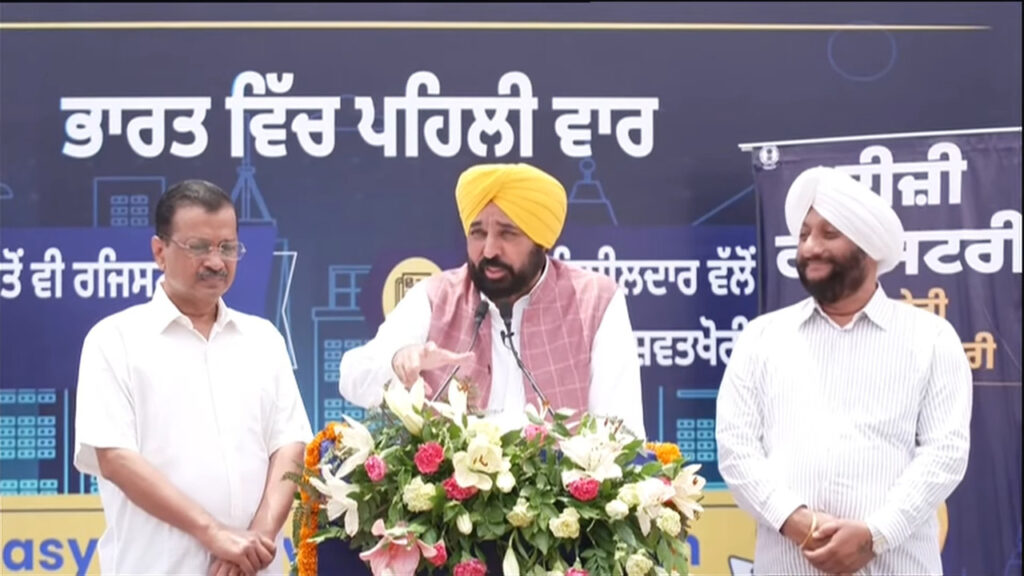In an era where digitization is reshaping industries worldwide, the Punjab Government has taken a pioneering step to modernize property registration with the launch of the Easy Registry scheme. This innovative digital initiative promises to simplify, accelerate, and enhance transparency in the property registration process, making it a game-changer for Punjab’s real estate sector.
Unveiled as part of the state’s commitment to efficient governance, Easy Registry aligns with India’s broader “Digital India” vision, aiming to eliminate bureaucratic hurdles, curb corruption, and empower citizens.
What Is Easy Registry?
The Easy Registry scheme is a cutting-edge digital property registration platform introduced by the Punjab Government to streamline land and property transactions across the state. Launched on May 26, 2025, in Mohali by Chief Minister Bhagwant Mann alongside Aam Aadmi Party (AAP) National Convenor Arvind Kejriwal, this initiative marks a significant leap toward digitizing public services.

At its essence, Easy Registry seeks to overhaul the traditionally slow and opaque property registration process. It enables citizens to register their property entirely online, complete with document uploads, payments, and a remarkable turnaround time of 48 hours. By removing physical barriers and intermediaries, the scheme ensures a seamless, transparent, and citizen-friendly experience—heralding a new era in Punjab’s real estate landscape.
Key Highlights of Easy Registry
- Fully Digital Process: From document submission to payment, everything is managed online.
- Flexible Office Selection: Citizens can choose any sub-registrar office in their district.
- Doorstep Convenience: Sewa Sahayaks facilitate document pickup from homes.
- Rapid Turnaround: Registration completed within 48 hours.
- Corruption-Free: Eliminates middlemen, enhancing transparency.
This scheme is currently a pilot project. Launched as a pilot in Mohali, the system is set to be implemented across Punjab by August 1, 2025, after a trial period from July 15 to August 1, 2025.
“This is a major step because it will eliminate the need for individuals to run from department to department and deal with middlemen or brokers because everything will be quickly, clearly, and transparently available over the phone,” Mann said.
How Does Easy Registry Work?
The Easy Registry scheme simplifies property registration into a few intuitive, tech-driven steps. Here’s a detailed breakdown of the process:
- Online Document Submission and Payment
Citizens access the official Easy Registry portal to upload essential documents, such as the sale deed, identity proofs, and property details. Payments for registration fees and stamp duty are made securely online, reducing the need for cash transactions or physical visits. - Sub-Registrar Office Selection
Unlike the rigid traditional system, Easy Registry allows users to pick any sub-registrar office within their district, offering unprecedented flexibility and convenience. - Doorstep Document Pickup
For those preferring minimal effort, Sewa Sahayaks (service assistants) collect physical documents from the citizen’s doorstep, delivering them to the selected office. - Verification and Completion
The sub-registrar office verifies the submitted documents and finalizes the registration within 48 hours. Users receive real-time updates via SMS or email upon completion. - Digital Record Access
Registered documents are stored digitally, accessible anytime through the portal, ensuring secure and efficient record-keeping.
This end-to-end digital workflow minimizes human intervention, reduces errors, and provides a transparent, trackable process—setting a new benchmark for property registration in India.
Mann said: The technology ensures that citizens are always aware of their status by providing real-time WhatsApp notifications at each stage of the document process, including submission, approval, payment, and appointment.
Benefits of Easy Registry
The Easy Registry scheme delivers a host of advantages, making it a win-win for citizens and the government alike. Below are the key benefits:
| Benefits for Citizens | Benefits for Government |
| Time Efficiency: Registration completed in 48 hours instead of weeks. | Operational Efficiency: Faster processing with digital tools. |
| Ease of Access: Online access and doorstep services remove the need for travel and queues. | Anti-Corruption Measure: Eliminates intermediaries to reduce malpractice. |
| Transparency: Digital trail increases visibility and accountability. | Enhanced Record Management: Digital archives ensure accuracy and easy retrieval. |
| Cost Savings: No middlemen mean lower unofficial costs. | Revenue Potential: Simpler registration could boost transactions and stamp duty revenue. |
| Inclusivity: Accessible for both rural and urban users with internet. |
By addressing long-standing pain points, Easy Registry redefines property registration as a swift, trustworthy service.
Punjab Government’s Vision Behind Easy Registry
The Easy Registry scheme embodies the Punjab Government’s ambition to deliver citizen-centric governance through technology. During the Mohali launch, Chief Minister Bhagwant Mann described it as a fulfillment of the state’s pledge for “zero delay and zero corruption”, emphasizing its role in enhancing public service delivery.
Revenue Minister Sukhbinder Singh Sarkaria echoed this sentiment, noting that Easy Registry prioritizes simplicity and integrity. “This is about making life easier for Punjabis while ensuring a process free from touts,” he stated, underscoring the scheme’s dual focus on speed and fairness.
Aligned with the national “Digital India” initiative, Easy Registry builds on earlier efforts like Punjab’s 2018 online registration system. However, it goes further by offering a comprehensive digital solution, positioning Punjab as a trailblazer in e-governance among Indian states.
Impact on the Indian Real Estate Market
The Easy Registry scheme is poised to reshape Punjab’s real estate sector while influencing broader market trends in India. Here’s how:
Stimulating Property Transactions
A faster, hassle-free registration process could spur more buying and selling activity. First-time buyers, investors, and developers may find Punjab’s real estate market more appealing, driving economic growth.
Promoting Transparency
Opaque property dealings have long plagued India’s real estate sector. Easy Registry’s digital framework ensures verifiable records, reducing disputes and fraud—a critical step toward a trustworthy market.
Inspiring Nationwide Adoption
If successful, Punjab’s model could inspire states like Maharashtra, Karnataka, or Gujarat to implement similar systems, fostering a nationwide shift toward digital registration and modernizing India’s real estate ecosystem.
Complementing National Reforms
The scheme aligns with initiatives like the Real Estate (Regulation and Development) Act, 2016 (RERA), which promotes accountability. Together, they strengthen the sector’s credibility and efficiency.
Traditional vs. Easy Registry: A Comparison
To grasp Easy Registry’s significance, let’s contrast it with the conventional process:
| Aspect | Traditional Property Registration | Easy Registry |
| Duration | Weeks or months with multiple office visits. | Just 48 hours, fully online. |
| Middlemen | Prevalent, increasing costs and corruption risks. | None, thanks to digitization. |
| Accessibility | Challenging for rural residents due to distance. | Available to all with internet access. |
| Records | Paper-based, vulnerable to loss or tampering. | Secure, digital, and easily retrievable. |
This stark contrast highlights how Easy Registry resolves inefficiencies, making it a revolutionary upgrade.
Future Prospects
As a pilot, Easy Registry’s success could lead to statewide rollout and inspire similar initiatives elsewhere. Future enhancements might include integration with other services (e.g., mutation or land records) or AI-driven verification, further streamlining processes. Nationally, it could catalyze a digital transformation in property registration, aligning with India’s smart governance goals.
Conclusion: A New Dawn for Property Registration
The Easy Registry scheme is more than a technological upgrade—it’s a bold stride toward efficient, transparent governance in Punjab. By slashing registration time to 48 hours, eliminating middlemen, and embracing digital innovation, it empowers citizens and strengthens the real estate market.
For Punjab’s people, it’s an opportunity to experience property registration like never before. For India, it’s a blueprint for progress. As the scheme evolves, its ripple effects could redefine real estate standards nationwide. For more information on buying a property in Mohali, visit Lets Rentz now.



